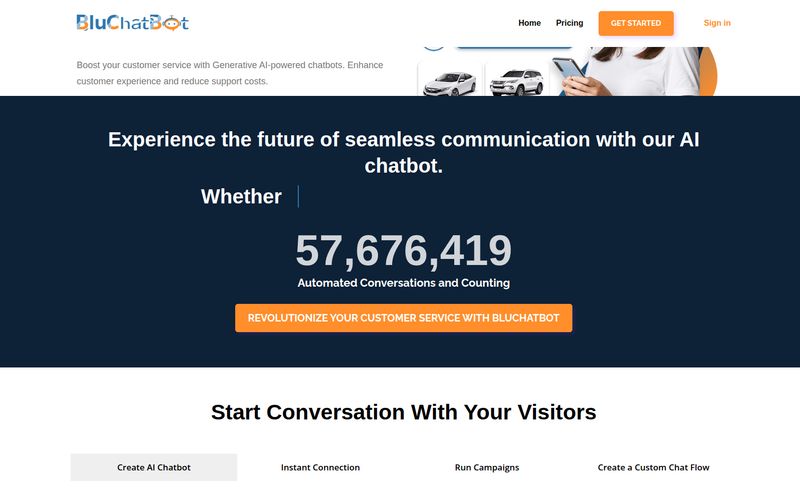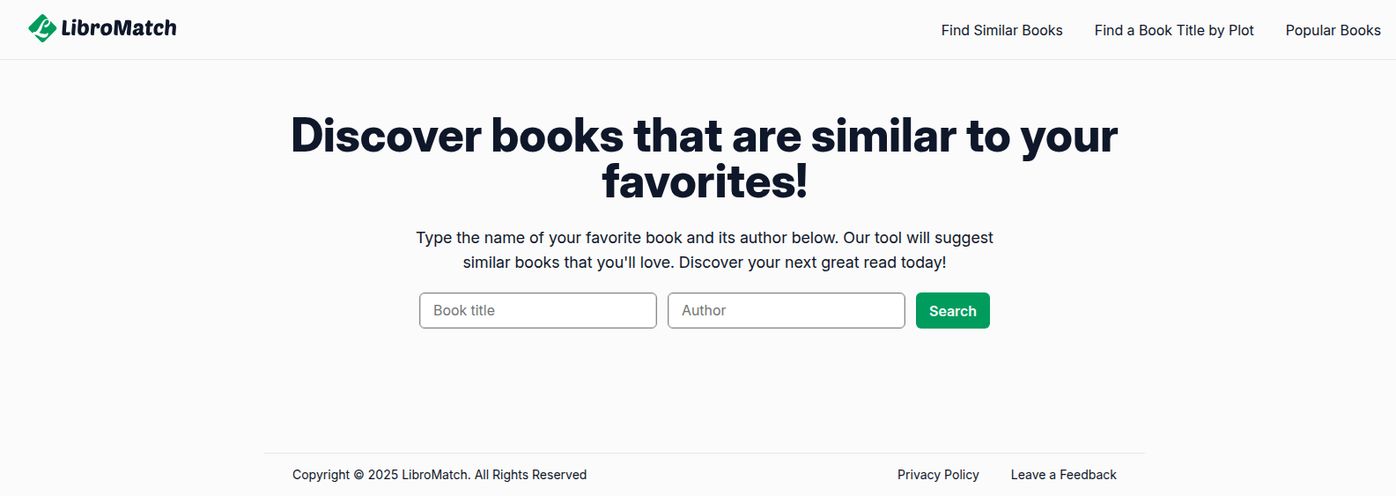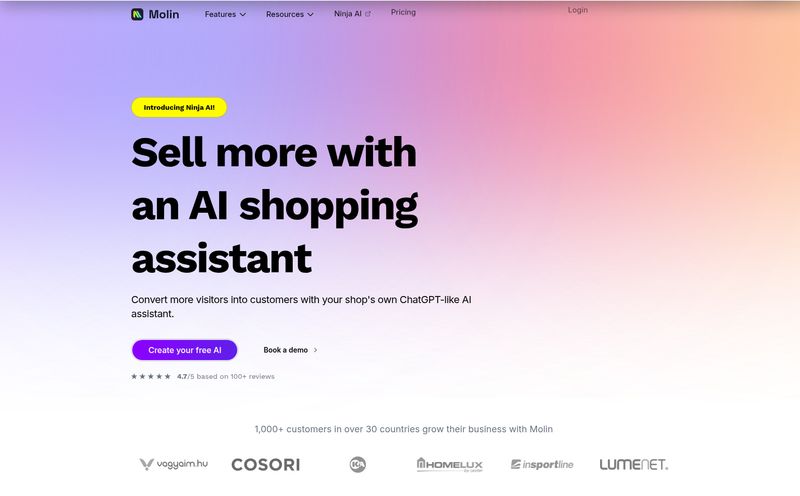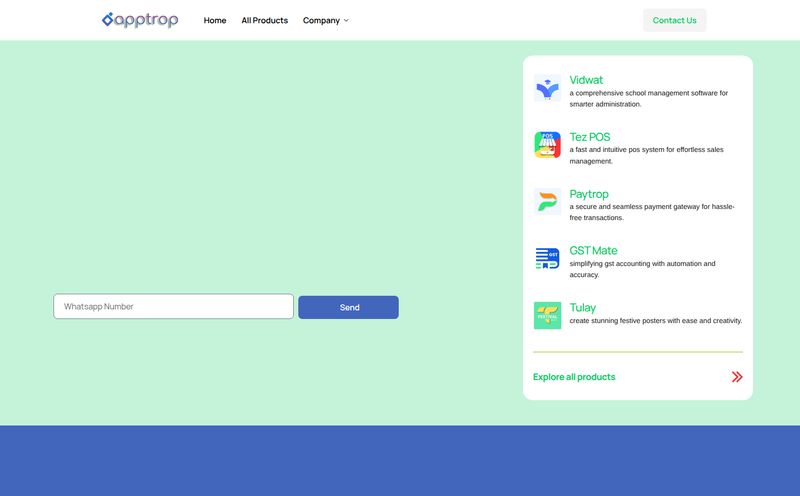If you're in enterprise sales, your calendar is a nightmare, your inbox is a warzone, and your CRM is… well, it’s probably a beautifully organized library of every deal you've ever touched. Right? Ha. Yeah, mine neither. More like a graveyard of half-filled fields and cryptic notes from three quarters ago.
We've all been there. Staring at a massive account like Netflix or Oracle, knowing you have a meeting in 48 hours, and feeling that pit in your stomach. The research chasm. You have to understand their C-suite, their latest earnings call, that weird comment their CTO made on a podcast, and what your own team has been emailing them about for the past year. It's an impossible amount of data scattered across a dozen different places.
For years, the solution has been more elbow grease. More tabs open. More caffeine. But lately, I’ve been seeing a new breed of tool emerge, and one that really caught my eye is called Endgame. It's not just another dashboard; it's being pitched as an AI-native “knowledge system” for sales. A pretty bold claim, so I had to take a look.
So What is Endgame, Exactly?
Imagine hiring a brilliant, incredibly fast research assistant. You don't have to train them on your industry, because they already get it. You just connect them to your company's brain—your Salesforce, your Gong call recordings, your team's emails, Google Drive, everything—and they instantly read and understand all of it. Then, you can just… ask them questions. In plain English.
That’s the core idea behind Endgame. It’s an AI answer engine built specifically for the glorious, messy world of go-to-market (GTM) teams. It's designed to turn that data swamp we all live in into a clear, navigable river of insights. Instead of spending five hours digging for a single nugget of gold, you can ask, “What are the top 3 business risks for [Target Account] mentioned in their 10-K?” and get a straight answer.
It’s a pretty compelling proposition, moving us from data hunting to actual strategy. It’s the difference between being a librarian and being the person who writes the book.
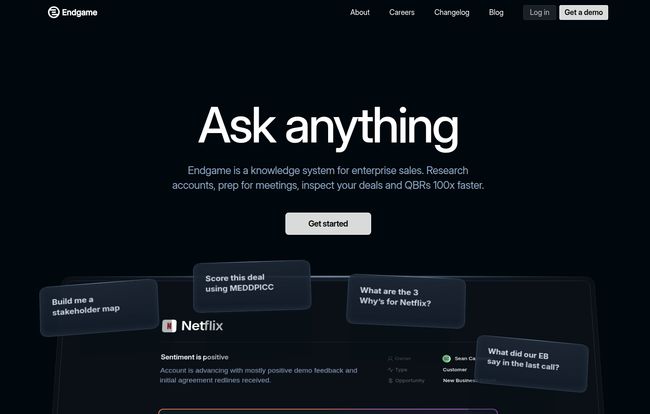
Visit Endgame
The Core Features That Actually Move the Needle
A shiny UI is one thing, but as an SEO and traffic guy, I know that features are only as good as the problems they solve. Here’s where I think Endgame starts to get really interesting for a busy Account Executive.
AI-Powered Account Research on Steroids
This is the main event. Endgame hoovers up information from internal sources (your CRM, emails, calls) and external ones (LinkedIn profiles, company news, financials, product docs). This isn’t just about spitting back facts; it's about synthesis. For example, you can ask it to prep you for a meeting, and it will generate a brief that includes recent interactions your team has had, key players involved, and relevant talking points from recent news. This is the kind of prep work that separates the top 1% of sellers from everyone else, and Endgame automates most of it.
Relationship Mapping and That All-Important Sentiment
Org charts are lies. Okay, maybe not lies, but they are certainly not the whole truth. We all know the real influence in a deal often doesn't sit with the person who has the fanciest title. Endgame analyzes the communication patterns—who's emailing whom, who is mentioned in calls, and the tone of those interactions—to build a more realistic relationship map. It tries to figure out who your champions are, who the potential blockers might be, and where the true power centers lie within an account. This is huge. Knowing who to spend your political capital on can make or break a seven-figure deal.
Automated Briefings and Risk Analysis
This might be my favorite part. Before a big call, you can ask Endgame to generate a brief. But you can also use it for proactive risk assessment. By analyzing communication sentiment and engagement frequency, it can flag accounts that are going cold or deals where a key champion has gone silent. It’s like an early warning system. Instead of getting blindsided on your weekly forecast call, you get a heads-up that you need to re-engage with the team at Acme Corp before things go south.
How Endgame Plugs Into Your World
A tool is useless if it creates another silo. The power here comes from its integrations. The website highlights the big ones: Salesforce, Zendesk, LinkedIn, and Google Drive. It also mentions connecting to call recorders like Gong. This is critical. By sitting on top of the tools your team already uses, it lowers the barrier to adoption. It’s not asking you to change your workflow; it’s promising to make your existing workflow smarter.
Of course, this is also its biggest hurdle, which I'll get to in a moment. But the concept is sound: unify the scattered knowledge of your entire GTM organization into one searchable, intelligent layer.
The Good, The Bad, and The Realistic
No tool is perfect, and any honest review needs to talk about the trade-offs. I've been in this game long enough to know there's no such thing as a magic bullet. Not even a fancy AI-powered one.
The Upside (Why I'm Genuinely Excited)
The potential time savings here are just massive. The hours spent on manual research can be reinvested into what sellers do best: building relationships and closing deals. It helps build credibility fast. Walking into a meeting with deep, nuanced understanding of a client's business isn't just impressive; it builds trust. You're not just a vendor; you're a strategic partner. And for my money, the ability to identify risks and opportunities proactively is a true game-changer. It shifts a sales team from being reactive to proactive.
A Dose of Reality (The Not-So-Shiny Parts)
Okay, let's ground ourselves. First, this thing isn't a one-click install. You have to connect it to your CRM, email, call recorder, etc. That means getting buy-in from IT and going through a setup process. It's not a weekend project. Second, and this is the big one, the AI is only as good as the data you feed it. If your Salesforce instance is a mess and no one logs calls, Endgame can't invent insights out of thin air. It relies on the principle of garbage in, garbage out. You need a certain level of data maturity for a tool like this to really shine. It's a powerful engine, but it needs quality fuel.
So, What's the Price Tag?
Ah, the million-dollar question. Or, hopefully, a bit less. When I tried to find a pricing page on their site, I hit a classic “Page Not Found” error. This isn't a mistake; it's a signal.
Endgame is enterprise software, and that almost always means custom pricing. You won’t find a neat little three-tiered pricing table. The cost will likely depend on the number of users, the specific integrations you need, and the volume of data being processed. The call to action is clear: “Get Started” or “Request a Demo.” This is standard practice for high-ticket B2B tools, so be prepared to have a conversation with their sales team to get a quote tailored to your organization.
Who Is This For? (And Who Should Probably Skip It?)
Based on its features and positioning, Endgame is squarely aimed at enterprise sales teams. I’m talking about Account Executives, Strategic Account Managers, and Sales Leaders who manage complex, long-cycle deals with multiple stakeholders. If you know what MEDPICC or other sophisticated sales methodologies are, this tool is speaking your language.
Who should pass? If you're a small business with a straightforward, high-velocity sales process, this is probably overkill. If your team doesn't have a well-maintained CRM or use a call recording platform, you won't get the full value. You need to have the data infrastructure in place first.
Frequently Asked Questions
How is Endgame different from my CRM like Salesforce?
Think of it this way: Your CRM is the database where you store structured information (contacts, deal stages, company size). Endgame is the intelligence layer that sits on top of it, analyzing all the unstructured data (email content, call transcripts, news articles) to give you context and answers your CRM can't provide on its own.
Is Endgame secure for our sensitive customer data?
According to their website, they emphasize “enterprise-grade security” with zero-trust architecture. For any enterprise considering this, a deep dive into their security and compliance certifications (like SOC 2) during the sales process is a must, but they appear to take it seriously.
How long does the initial setup take?
This will vary. Connecting the APIs for Salesforce, Google Workspace, etc., can be quick for a savvy admin. The real work is ensuring your source data is clean. If your data hygiene is good, the setup will be smoother. If not, you might have some cleanup work to do first to maximize the tool's effectiveness.
Can Endgame actually predict if a deal will close?
It's more of a co-pilot than a crystal ball. It can't predict the future with 100% certainty, but it can significantly improve your forecasting. By flagging risks like a key champion going dark or negative sentiment in communications, it gives you a much more accurate, data-backed view of a deal's health than gut feel alone.
Does it only work for sales teams?
While its primary focus is enterprise sales, the underlying technology could be valuable for any GTM function. Imagine a Customer Success Manager using it to understand a client's history before a renewal conversation, or a Marketing team using it to understand customer language for better campaigns. The potential is definitely there.
My Final Take
I've seen a lot of tools that promise to revolutionize sales. Most are just incremental improvements. Endgame feels different. It represents a fundamental shift from data entry to data intelligence. It’s not about giving you more charts to look at; it's about giving you answers so you can spend your time on what humans do best: building relationships, thinking creatively, and navigating complex social dynamics.
It’s not a magic wand. It requires a commitment to data hygiene and a proper setup. But for the right kind of enterprise sales organization—one that's drowning in data but starving for wisdom—Endgame could be less of a tool and more of an indispensable member of the team. A very, very smart member, at that.
